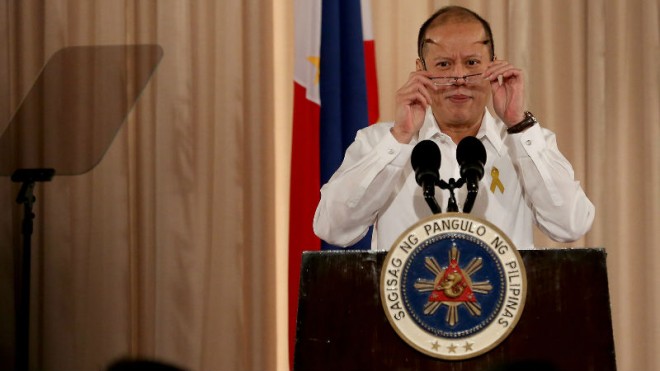
Presient Benigno Aquino lll announces the Salary standardization for Government Employees during the 2015 Search for Outstanding Public Officials and Employees Awrds held in malacanang.
INQUIRER PHOTO/JOAN BONDOC
BAGUIO CITY, Philippines—How did the Aquino administration fail the mining industry?
President Benigno Aquino III’s effort to reform mining regulations, his economic priorities and even Malacañang’s supposed inability to detect fraud in the export of raw minerals were outlined by mine leaders and experts in this year’s National Mine Safety and Environment Symposium at Camp John Hay here.
Low world metal prices and the administration’s economic fiscal regime are “the two primary threats” against mining these days, said Jose Leviste, chair of OceanaGold Phils Inc., in a keynote speech at the symposium on Thursday.
Leviste cited a Malacañang-initiated measure to raise government share in mining that is pending in Congress.
The Aquino administration’s “disappointing track record” has compelled mine executives to seek new leaders “who love us” in the 2016 national elections, Leviste said.
“I suggest we flex our political muscles… I follow this principle where I offer my love to those who love me… If a candidate loves us, why shouldn’t we carry his or her candidacy? If the candidate is antimining, then he or she need not seek our votes anymore,” he said.
“Mining exploration and development are not a priority of the current administration. It did not merit [a mention] in the [President’s] State of the Nation Address on July 27, and it was not even included in the investment priorities plan of the Department of Trade and Industry,” said a paper delivered by De La Salle University Economics professor Patrick Caoile.
Caoile urged the government to view mining as a “logical” growth driver of the economy.
“Agriculture is down with the failure of land reform. Rice in the Philippines is three times as expensive to produce [compared to] Vietnam and Thailand. The build-operate-and-transfer law (now known as the public-private partnership program) which is currently the hallmark of this administration’s [economic programs] is mired in arbitration proceedings in Singapore [because the government questioned deals made by former President Gloria Macapagal-Arroyo].”
Former Energy Undersecretary Rufino Bomas-ang, who joined one of the forums, said the administration’s changing of rules in the middle of contracts had turned away investors. Bomas-ang was former president of the Philippine National Oil Company’s Exploration Corp.
Caoile said the major drivers of growth under the Aquino administration have been overseas migrant workers and the business process outsourcing companies.
But he said this was growth reached “without government help.”
“The government, in fact, was the major cause of the lower than expected growth of 5 percent in the first quarter due to the lower than expected government expenditure. If government did its role and spent what it budgeted for then the growth level is easily 6 to 7 percent,” Caoile said.

